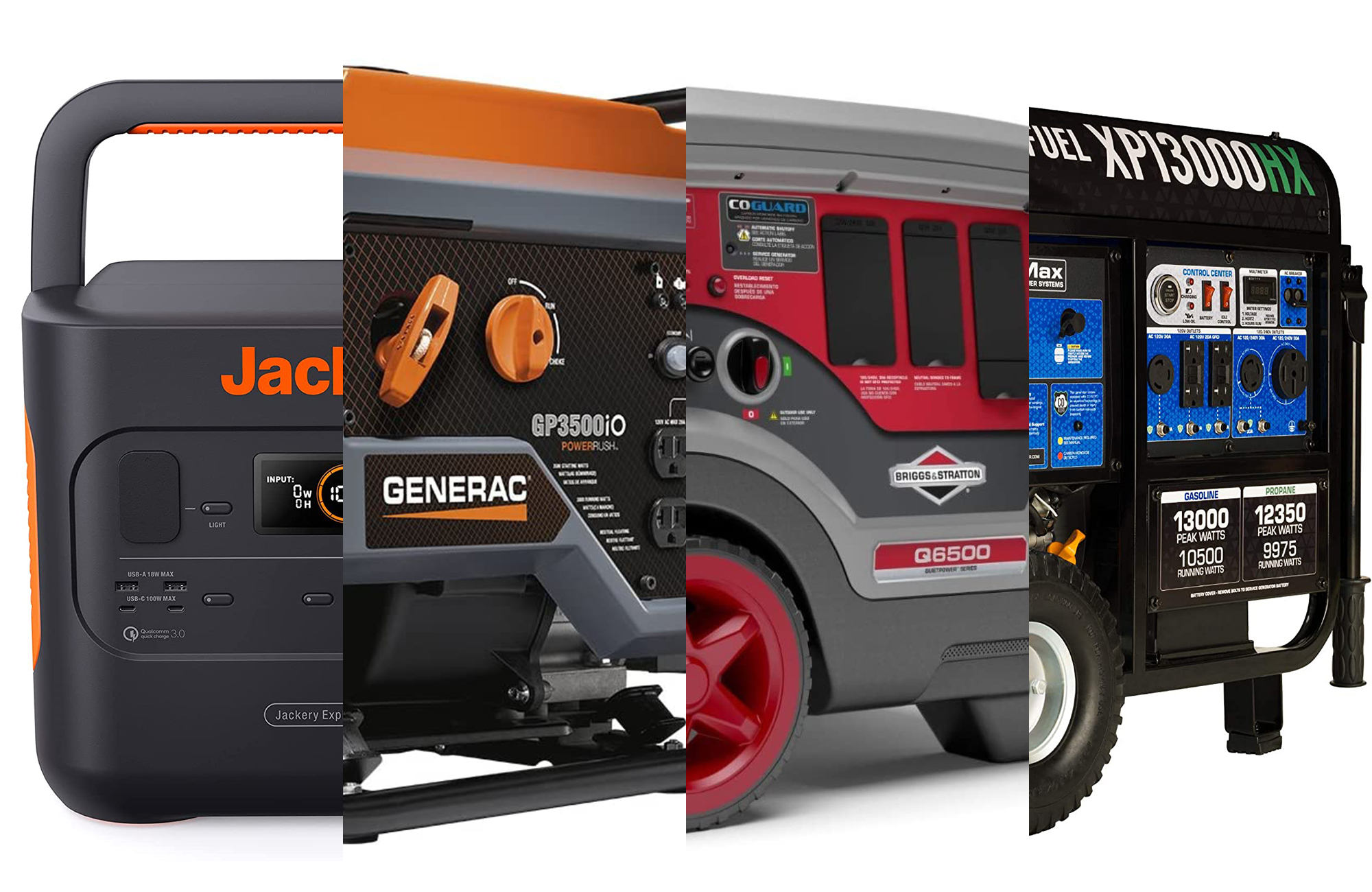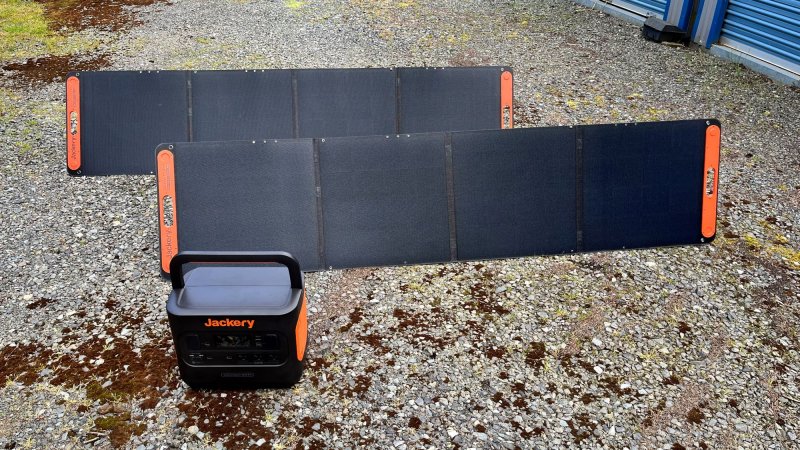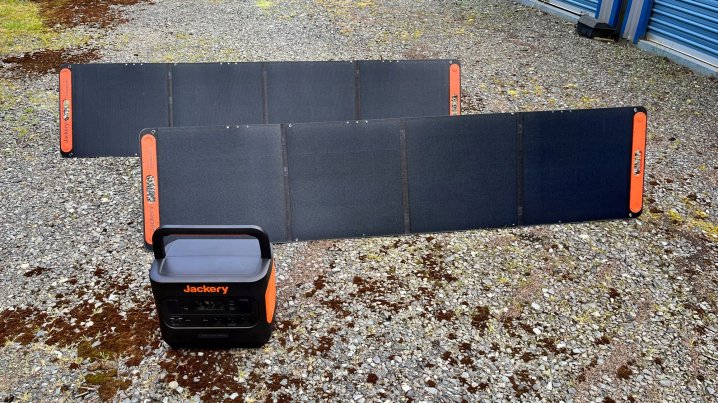We may earn revenue from the products available on this page and participate in affiliate programs. Learn more ›

The issue with old-school generators is that they always operated at full bore, burning fuel and pumping out power at the highest possible capacity at all times, but inverter generators solve the problem. They offer a throttle that adjusts engine speed to meet actual electrical needs. This greatly improves fuel efficiency, reduces emissions, and decreases operating volume. Inverter generators also provide an extremely clean source of electricity that won’t harm sensitive devices with unpredictable and inconsistent power output. Whether you’ve got hurricane preparedness or just generally useful home appliances on your mind, the best inverter generators offer solid efficiency and runtime, rock-solid craftsmanship, and deliver the reliability you need when the lights go out.
- Best overall: Generac GP3500iO
- Most sustainable: Jackery Explorer 2000 Pro
- Best for home backup: Briggs & Stratton Q6500 QuietPower Series
- Best for RVs: Honda EU2200i
- Best dual-fuel: DuroMax XP13000HX
- Best budget: WEN 56203i Super Quiet
How we picked the best inverter generators
As a tech enthusiast and camping addict, I’ve looked at a wide range of mobile power products for the likes of Popular Science, Scientific American, The Daily Beast, and more. I’ve researched each of these selections extensively via a combination of first-hand trials, input from experts, and reviews from real-world consumers. We focus on generators that offer solid build quality, powerful performance, and reliability. A generator isn’t worth much if you can’t be sure it will work when you really need it.
The best inverter generators: Reviews & Recommendations
Our top-rated inverter generators represent a range of uses and budgets. Some are designed to provide full-fledged backup power for an entire home. Others are more portable for camping, worksites, or other smaller-scale intentions. In any case, below you’ll find something that fits your circumstances.
Best overall: Generac GP3500iO
Best Inverter Generator Overall
Reliable Power
Pros
- Outstanding reliability
- Solid output
- Quiet
- Relatively light
Cons
- No wheels
- Not enough output for a whole house
Why it made the cut: Solid performance, superior reliability, and outstanding versatility make the Generac GP3500iO a great all-around inverter generator.
Specs
- Rated output: 3,000W
- Peak output: 3,500W
- Gas tank capacity: 2.37 gallons
- Weight: 74.3 lbs
- Runtime: 11 hours at 25 % rated load
- Price: $839
When it comes to building an inverter generator that delivers a lifespan worthy of the investment, Generac is as good as they come. The GP3500iO is built to last and will provide many years of reliable power.
Speaking of which, its power output is no slouch either. While its 3,000-3,500W operating range isn’t large enough to keep an entire house powered, it is more than enough to keep key appliances operating or to keep a campsite, RV, or off-grid worksite fully electrified. It’s also parallel-ready, so if you do need more power you can chain a second unit in to double the output. And at a surprisingly competitive price of just over $800, buying two isn’t all that much of a stretch.
It’s 50% quieter than most comparably sized generators, making it perfect for hauling out into nature. That being said, it’s a bit lighter than many similar models, it isn’t exactly featherweight and it doesn’t come with wheels, so some may find it somewhat challenging to wrangle in and out of the RV.
For all intents and purposes, however, we think the GP3500iO is the best inverter generator for the money thanks to its outstanding build quality, performance, and versatility.
Most sustainable: Jackery Explorer 2000 Pro
Most sustainable
Solar sustainability

Pros
- Super portable
- Easy to use
- Solid output
- Super fast charging
Cons
- Not enough output for a whole house
- Can only be charged in the sun
Why it made the cut: If you’re looking for plenty of sustainable, portable power, the Jackery Explorer 2000 Pro delivers.
Specs
- Rated output: 2,200W
- Peak output: 4,400W
- Gas tank capacity: N/A
- Weight: 43 lbs
- Runtime: 2,160 Watt hours
- Price: $2,099
In its own offshoot class of inverter generators—that of the electric generators, meaning that it requires no gas at all—the Jackery Explorer 2000 Pro offers substantial, sustainable, highly portable power. In fact, we like the 2000 Pro so much that we named it the top solar generator of the year.
With output ranging between 2,200-4,400 watts, the 2000 Pro delivers more power than virtually any other solar power generator on the market. While the runtime of its 2,160 Wh capacity depends entirely upon how much you ask of it, it’s capable of powering a full-sized fridge for over three hours, a portable electric cooler for 15 hours, a hand drill for 60 hours, and can charge small devices like a smartphone or laptop dozens and dozens of times. It also recharges fast, going from empty to 100% in under two hours when plugged into a wall outlet or in just 2.5 hours when plugged into its solar array.
The Jackery 2000 Pro is also super portable and super user-friendly, making it an ideal choice for camping or van–lifing. While it’s not powerful enough to keep an entire house juiced, it will serve as a solid source of backup power in the event that the lights go out, allowing you to keep a few key appliances and devices running.
Best for home backup: Briggs & Stratton Q6500 QuietPower Series
Best for home backup
Quiet but powerful
Pros
- Solid output
- Quiet
- Easy to move and store
- Power usage meter
Cons
- Some buyers report customer service issues
Why it made the cut: For emergency backup power at home, the Briggs & Stratton Q6500 delivers solid yet quiet performance.
Specs
- Rated output: 5,000W
- Peak output: 6,500W
- Gas tank capacity: 2.37 gallons
- Weight: 128 lbs
- Runtime: 14 hours at 25% load
- Price: $1,399
When you need an inverter generator to power your entire home, power output is your foremost concern. The Briggs & Stratton Q6500 QuietPower Series delivers more than enough output capacity and runtime to suit the average homeowner’s needs. What’s more, it’s also quieter than most other generators, making about as much noise as a dishwasher.
All of that makes it ideal for at-home emergency backup power use, but the deal is sweetened thanks to its highly mobile, highly storable design. Its telescoping handle sets flush into its square shape, making it easy to store in the garage. When it’s time to deploy, the inclusion of sturdy wheels makes it easy to roll into place.
Some users have reported issues when seeking customer service from the company, but their experience seems to be in the minority. Generally speaking, this is an outstanding generator to have on hand for when the lights go out.
Best for RVs: Honda EU2200i
Best for RVs
Portable and Powerful
Pros
- Outstanding portability
- Outstanding reliability
- Solid power output
- Quiet
Cons
- Not powerful enough for a while house
Why it made the cut: If you need a tough, reliable source of power on the go, the Honda EU2200i is the best recreational inverter generator out there.
Specs
- Rated output: 1,800W
- Peak output: 2,200W
- Gas tank capacity: .95 gallons
- Weight: 47.4 lbs
- Runtime: 8.1 hours at 25 % rated load
- Price: $1,199
Fun fact: Honda actually released the first inverter generator ever back in 1987. That being the case, it should come as no surprise that they’ve had plenty of time to perfect the art.
And perfect the Honda EU2200i is—at least for the purposes of RVing or camping. It weighs less than 50 pounds and can easily fit in most common car trunks, it’s as portable as generators come. At the same time, it offers a solid 1,800-2,200W of power, which is enough to run virtually any RV air conditioner with room left over to charge an array of devices.
What’s more, the EU2200i is one of the most solidly built generators on the market. With a typical lifespan of somewhere between 1000-2000 operating hours, a properly maintained EU2200i should last some 10-20 years.
Best dual-fuel: DuroMax XP13000HX
Best dual fuel
Two Is Better than One
Pros
- Dual-fuel versatility
- Massive power output
- Rock-solid construction
- Wheel kit included
Cons
- Very heavy
- Very expensive
Why it made the cut: With its high output and solid construction, the DuroMax XP13000HX is as reliable as they come.
Specs
- Rated output: 10,500W
- Peak output: 13,000W
- Gas tank capacity: 8.3 gallons
- Weight: 238 lbs
- Runtime: 13 hours at 25 % rated load
- Price: $1,499
We like the DuroMax XP1300HX so much that we placed it at the top of our roundup of the best dual-fuel generators. Not only does it produce an enormous amount of power—more than enough to power an entire house—but its dual-fuel versatility allows it to run on both gas and propane. This makes it easier to find fuel sources in a pinch, and when fueled by propane means that it will be quieter and produce fewer emissions. It’s also as solidly built as any machine most humans will ever own.
That solid build does translate into weight—a hefty 238 pounds of it. The wheels do make it easy to move around wheel-barrow-style, but you definitely won’t be bringing it camping. As far as emergency home backup power goes, however, the XXP1300HX is outstanding.
Best budget: WEN 56203i Super Quiet
Best budget
Cheap but Great
Pros
- Rock-bottom price
- Quiet
- Great runtime
- Super portable
Cons
- Relatively low power output
Why it made the cut: The WEN 56203i Super Quiet offers substantial quality at a low price.
Specs
- Rated output: 1,700W
- Peak output: 2,000W
- Gas tank capacity: 1 gallon
- Weight: 38 lbs
- Runtime: 10.8 25% rated load
- Price: $429
At $340, the WEN 56203i Super Quiet is about as budget-friendly as generators get. What makes it stand out is that it offers significantly better performance than every other generator in its class.
Capable of churning out a steady 1,700-2,000W, this generator isn’t going to power your house but it will serve as a decent source of emergency power in a pinch, and it serves as a great camping option. Its campability is accentuated by its quiet performance and outstanding portability. It also sips fuel efficiently, delivering a great runtime for its fuel capacity.
What to consider when buying inverter generators
There are a lot of inverter generators out there, but they tend to come with lofty price tags. It requires hardware to actually invert the current, which allows it to avoid voltage spikes that could harm devices plugged into it. Many subpar brands simply don’t offer the build quality that you would expect from such a high-value piece of equipment, while others fall short of delivering the performance you need for reliable power. To make a smart buy, here are a few important considerations to keep in mind so that you can be sure of getting the best inverter generator for the money:
Power output
If a generator doesn’t produce enough power to meet your needs, what good is it? Generators are rated by the number of watts they can produce in any given moment, which is often accompanied by a peak performance rating that represents the maximum power they can deliver in short bursts. To determine how much juice you need, add up the operating wattage for all the devices and appliances you expect to power, then find a generator that delivers accordingly. The average 5000-7500W generator, for example, will generally provide enough power for most of the key items in your home, including the fridge, TV, lighting, well pump, and a smattering of small devices.
Runtime
If you expect to be using your inverter generator for long periods at a time—if you live somewhere with frequent or prolonged power outages, for example, or if you’ll be needing off-grid power all day long—you don’t want to be refueling it again and again. Runtimes are determined by how large a generator’s fuel tank is combined with its operating efficiency. Most inverter generators have runtimes of roughly 5-6 hours, though a few highly efficient models can stretch that to nearly a full day.
Fuel type
While the majority of inverter generators run on gasoline, many also run on propane or natural gas, and a few can even be powered by the sun. Gas generators offers the most power output but it’s also the loudest and causes the most emissions. Propane and natural gas shave off a bit of the output in favor of quieter, cleaner operations. Solar generators are emission-free and just shy of silent, but they can only be recharged if the sun is out (or a wall/car socket is handy).
Size and weight
Inverter generators come in a variety of sizes and weights, resulting in varying degrees of portability. Some are large and essentially immobile, which means they’re designed to be set in place and forgotten about until the need arises. Others are more portable thanks to reduced size, weight, or the addition of handles and wheels.
Reliability
A generator doesn’t do much good if it breaks down when you need it. Reliable craftsmanship is essential, but it can be difficult to determine at a glance or by reading a spec sheet. We’ve verified the reliability of our picks via reviews from owners who have used specific models over time.
FAQs
An inverter is a component in an inverter generator that converts AC power into DC power and then “inverts” it back into cleaner AC power. That might sound technical but the important thing is that it results in power that is “safer” for sensitive devices like laptops or smartphones, and it throttles the engine to match your actual power demands, which improves a generator’s efficiency.
While industrial-grade inverter generators can get quite large, the highest wattage you’ll find at the consumer level is about 15,000-17,500. That’s wildly unnecessary for the typical user. The largest generator we’ve suggested is the DuroMax XP13000HX, which can produce up to 13,000 watts—more than enough for the average home.
All of the generators we’ve recommended above offer outstanding reliability. In terms of lifespan, most will last upwards of 10 years with proper maintenance.
Absolutely. The “clean” power produced by an inverter generator ensures that all your electronics can operate safely. As long as you buy a model that offers the appropriate level of power for your needs, it is perfectly suited for the task.
That depends on how you intend to use it. To power the majority of your home—including a fridge, lights, TV, and a smattering of other small appliances and devices—you’ll want at least 4,000W. If you’ll be camping and powering an RV, shoot for at least 1,800 watts as most RV air conditions require around 1,500W and you’ll want a little leftover for lights and charging your phone.
Final thoughts on the best inverter generators
- Best overall: Generac GP3500iO
- Most sustainable: Jackery Explorer 2000 Pro
- Best for home backup: Briggs & Stratton Q6500 QuietPower Series
- Best for RVs: Honda EU2200i
- Best dual-fuel: DuroMax XP13000HX
- Best budget: WEN 56203i Super Quie
If you live in an area where power cuts are frequent, an inverter generator will be a game-changer. It will ensure that you have plenty of reliable power while everyone else on the block sits in the dark. And if you’re looking to power an RV, an inverter generator will keep you living in comfort while off the grid. While the best inverter generators are no small investment, one will pay for itself in the long run in terms of comfort and peace of mind.








